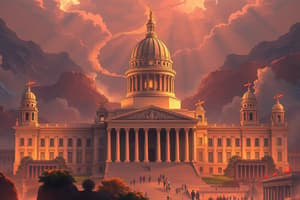Podcast
Questions and Answers
What is the primary function of government related to the development of laws and policies?
What is the primary function of government related to the development of laws and policies?
- Adjudication
- Execution
- Fiscal policy
- Legislating (correct)
Which function of government involves resolving conflicts by providing justice through judicial systems?
Which function of government involves resolving conflicts by providing justice through judicial systems?
- Adjudication (correct)
- Execution
- Legislating
- Fiscal policy
What is the primary focus of fiscal policy as a function of government?
What is the primary focus of fiscal policy as a function of government?
- Legislating
- Raising revenue and distributing resources (correct)
- Execution
- Adjudication
In which type of government do people have the power to elect leaders who represent their interests?
In which type of government do people have the power to elect leaders who represent their interests?
What distinguishes direct democracy from representative democracy?
What distinguishes direct democracy from representative democracy?
Which form of governance involves civic participation without intermediaries?
Which form of governance involves civic participation without intermediaries?
What is autocracy?
What is autocracy?
Which historical form of government evolved into modern federal republics?
Which historical form of government evolved into modern federal republics?
What factor contributed to the evolution of governments from tribal organizations to more complex structures?
What factor contributed to the evolution of governments from tribal organizations to more complex structures?
In federalism, how are powers typically divided?
In federalism, how are powers typically divided?
What led to the need for more complex governing institutions as societies grew larger?
What led to the need for more complex governing institutions as societies grew larger?
Which system concentrates power within a single ruler?
Which system concentrates power within a single ruler?
Study Notes
Understanding Government: A Fundamental Principle of Society
Government is a fundamental aspect of human society; it's how we collectively make decisions, maintain order, and uphold our common values. To grasp this intricate institution more deeply, let's explore its basic concepts and historical evolution.
Essential Functions of Government
The primary functions of government encompass several key areas:
- Legislating: Developing laws and policies to regulate behavior and guide societal growth.
- Execution: Implementing these laws through various branches like executive departments and agencies.
- Adjudication: Resolving conflicts by providing justice via judicial systems.
- Fiscal policy: Raising revenue and distributing resources to support public services and promote economic health.
These functions ensure governments can manage their territory, protect national interests, safeguard citizens, and facilitate progress toward shared goals.
Types of Governments
Through history, societies have devised different forms of governance based on ideologies, cultural beliefs, and evolving needs:
-
Democracy: Empowering people with voting rights, allowing them to elect leaders who represent their interests.
- Direct democracy involves civic participation without intermediaries, while representative democracies select elected representatives to act on behalf of constituents.
-
Autocracy: Concentration of power within a ruler, such as monarchies, dictatorships, and totalitarian regimes.
-
Federalism: Division of powers between central authorities and local jurisdictions, typically seen in federations like nations comprising multiple states.
Each system has distinct features and advantages, often leading to debates over which form best serves diverse populations worldwide.
Evolution of Government
Historically, governments evolved from tribal organizations to city-states, empires, nation-states, and modern federal republics. This transformation was driven by factors including population growth, technological advancements, increased trade, and shifts in global politics. As societies grew larger and more complex, so too did the scope and complexity of governing institutions needed to manage them effectively.
In conclusion, government embodies essential principles and practices designed to help communities thrive and prosper. By understanding its core responsibilities and varied manifestations throughout time, we gain insight into the impetus behind contemporary political challenges and aspirations, thereby fostering critical engagement with our shared future.
Studying That Suits You
Use AI to generate personalized quizzes and flashcards to suit your learning preferences.
Description
Explore the essential functions, types, and historical evolution of governments worldwide. Learn about legislating, executing laws, adjudication, fiscal policy, democracy, autocracy, federalism, and the development of governing institutions through time.




